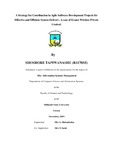Please use this identifier to cite or link to this item:
https://cris.library.msu.ac.zw//handle/11408/3971| Title: | A strategy for coordination in Agile Software Development Projects for effective and efficient system delivery, A case of Econet Wireless Private Limited. | Authors: | Shoshore, Tapiwanashe | Keywords: | Agile Software Development efficient system delivery effective system delivery |
Issue Date: | Nov-2019 | Publisher: | Midlands State University | Abstract: | Agile software development offered a deceptively simple means to organise complex multi-participant software development while achieving fast delivery of quality software, meeting customer requirements, and coping effectively with project change. There is little understanding, however, of how agile software development projects achieve effective coordination, a critical factor in successful software projects. Agile software development provides a unique set of practices for organising the work of software projects, and these practices seem to achieve effective project coordination. Therefore, this dissertation took a coordination perspective to explore how agile software projects work, and why they are effective. The outcome of this research was a theory of coordination in co-located agile software development projects. The findings show that agile software development practices form a coordination strategy addressing three broad categories of dependency: knowledge dependencies, task dependencies, and resource dependencies. Most coordination is for managing requirement, expertise, historical, and task allocation dependencies; all forms of knowledge dependency. Also present are task dependencies, which include activity or business process dependencies, and resource dependencies, which include technical or entity dependencies. The theory of coordination explains that an agile coordination strategy consists of coordination mechanisms for synchronising the project team, for structuring their relations, and for boundary spanning. A coordination strategy contributes to coordination effectiveness, which has explicit and implicit components. | URI: | http://hdl.handle.net/11408/3971 |
| Appears in Collections: | Master Of Science In Information Systems Management |
Files in This Item:
| File | Description | Size | Format | |
|---|---|---|---|---|
| SHOSHORE TAPIWANASHE FINAL DRAFT.pdf | Full Text | 1.62 MB | Adobe PDF |  View/Open |
Page view(s)
186
checked on Feb 26, 2025
Download(s)
96
checked on Feb 26, 2025
Google ScholarTM
Check
Items in MSUIR are protected by copyright, with all rights reserved, unless otherwise indicated.


